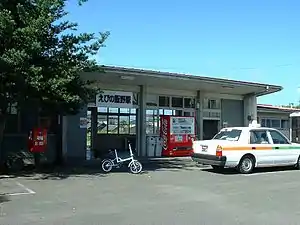Ebino Iino Station
Ebino Iino Station (えびの飯野駅, Ebino Iino-eki) is a train station in Ebino, Japan. It is operated by JR Kyushu and is on the Kitto Line.[1][2]
Ebino Iino Station えびの飯野駅 | |
|---|---|
 Ebino Iino Station in 2003 | |
| Location | Ebino, Miyazaki Japan |
| Coordinates | 32°01′50″N 130°52′15″E |
| Operated by | |
| Line(s) | ■ Kitto Line |
| Distance | 46.6 km from Miyakonojō |
| Platforms | 1 island platform |
| Tracks | 2 + 1 siding |
| Construction | |
| Structure type | At grade |
| Parking | Available at forecourt |
| Bicycle facilities | Bike shed |
| Other information | |
| Status | Unstaffed |
| Website | Official website |
| History | |
| Opened | 1 October 1912 |
| Previous names | Iino (until 1 November 1990) |
| Passengers | |
| FY2016 | 173 daily |
| Location | |
 Ebino Iino Station Location within Japan | |
Lines
The station is served by the Kitto Line and is located 46.6 km from the starting point of the line at Miyakonojō.[3]
Layout
The station consists of an island platform serving two tracks at grade with a siding. The station building is a modern concrete block structure which is now unstaffed and serves only as a waiting room. Access to the island platform is by means of a level crossing. Parking and a bike shed are available at the forecourt.[2][4]
History
On 1 October 1912, Japanese Government Railways (JGR) opened a track between Yoshimatsu and Kobayashi (then named Kobayashimachi) during the first phase of construction of what it then designated as the Miyazaki Line. Ebino Iino (at that time named Iino (飯野)) was opened on the same day as one of several intermediate stations along the track. On 15 December 1923, the stretch of track between Yoshimatsu and Miyakonojō which included Iino, was designated as part of the Nippō Main Line. On 6 December 1932, the same stretch was separated out and was designated as the Kitto Line with Miyakonojō as the starting point. With the privatization of Japanese National Railways (JNR), the successor of JGR, on 1 April 1987, Iino came under the control of JR Kyushu. On 1 November 1990, Iino was renamed Ebino Iino.[3][5][6]
Passenger statistics
In fiscal 2016, the station was used by an average of 173 passengers (boarding only) per day.[7]
See also
References
- "JR Kyushu Route Map" (PDF). JR Kyushu. Retrieved 23 February 2018.
- "えびの飯野" [Ebino Iino]. hacchi-no-he.net. Retrieved 13 May 2018.
- Imao, Keisuke (2009). 日本鉄道旅行地図帳 12号 九州 沖縄―全線・全駅・全廃線 [Japan Rail Travel Atlas No. 12 Kyushu Okinawa - all lines, all stations and disused lines] (in Japanese). Mook. pp. 21, 63. ISBN 9784107900302.
- Kawashima, Ryōzō (2013). 図説: 日本の鉄道 四国・九州ライン 全線・全駅・全配線・第7巻 宮崎・鹿児島・沖縄エリア [Japan Railways Illustrated. Shikoku and Kyushu. All lines, all stations, all track layouts. Volume 7 Miyazaki Kagoshima Okinawa Area] (in Japanese). Kodansha. pp. 50, 84. ISBN 9784062951661.
- Ishino, Tetsu; et al., eds. (1998). 停車場変遷大事典 国鉄・JR編 [Station Transition Directory - JNR/JR] (in Japanese). I. Tokyo: JTB Corporation. p. 232. ISBN 4533029809.
- Ishino, Tetsu; et al., eds. (1998). 停車場変遷大事典 国鉄・JR編 [Station Transition Directory - JNR/JR] (in Japanese). II. Tokyo: JTB Corporation. pp. 777–8. ISBN 4533029809.
- "宮崎県統計年鑑 鉄道輸送実績(1日平均)" [Miyazaki Prefecture Statistics Yearbook Railway Transportation Record (daily average)]. Miyazaki Prefectural Government website. Retrieved 6 May 2018. See the table for 平成28年度 [fiscal 2016].
External links
| Wikimedia Commons has media related to Ebino-Iino Station. |
- Official website (in Japanese)